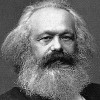It may be that everything we do is determined by some grand unified theory. If that theory has determined that we shall die by hanging, then we shall not drown. But you would have to be awfully sure that you were destined for the gallows to put to sea in a small boat during a storm. I have noticed that even people who claim that everything is predestined and that we can do nothing to change it look before they cross the road. Maybe it’s just that those who don’t look don’t survive to tell the tale.
Stephen Hawking (1942-2018) English physicist, author
“Is Everything Determined?” lecture, Sigma Club Seminar, Cambridge University (1990-04)
(Source)
Reprinted in Black Holes and Baby Universes, and Other Essays, ch. 12 (1994). Hawking's thesis that the universe is actually deterministic, but too complex to be predictable, so acting as though free will exists is useful socially and, like fluid dynamics equations, satisfactory for most purposes.
Quotations about:
free will
Note not all quotations have been tagged, so Search may find additional quotes on this topic.
People couldn’t become truly holy, he said, unless they also had the opportunity to be definitively wicked.
Terry Pratchett (1948-2015) English author
Good Omens, 2. “Eleven Years Ago” (1990) [with Neil Gaiman]
(Source)
All is in the hands of man. Therefore you should wash them often.
[Wszystko jest w rękach człowieka. Dlatego należy je często myć.]
Stanislaw Lec (1909-1966) Polish aphorist, poet, satirist
Unkempt Thoughts [Myśli nieuczesane] (1957) [tr. Gałązka (1962)]
(Source)
Just as most soldiers believe bullets will hit only others, not themselves, most citizens like to think that their own minds and thought processes are invulnerable. “Other people can be manipulated, but not me,” they declare. People like to think that their opinions, values and ideas are inviolate and totally self-regulated. They may admit grudgingly that they are influenced slightly by advertising. Beyond that, they want to preserve a myth in which other persons are weak-minded and easily influenced, but they are strong-minded.
Margaret Singer (1921-2003) American clinical psychologist and researcher
“The ‘Not Me’ Myth: Orwell and the Mind,” Idea (19 Jan 1996)
(Source)
For behind the unwillingness to judge lurks the suspicion that no one is a free agent, and hence the doubt that anyone is responsible or could be expected to answer for what he has done. The moment moral issues are raised, even in passing, he who raises them will be confronted with this frightful lack of self-confidence and hence of pride, and also with a kind of mock-modesty that in saying, Who am I to judge? actually means We’re all alike, equally bad, and those who try, or pretend that they try, to remain halfway decent are either saints or hypocrites, and in either case should leave us alone.
Hannah Arendt (1906-1975) German-American philosopher, political theorist
“Personal Responsibility Under Dictatorship” (1964)
(Source)
It is not murder which is forgiven but the killer, his person as it appears in circumstances and intentions. The trouble with the Nazi criminals was precisely that they renounced voluntarily all personal qualities, as if nobody were left to be either punished or forgiven. They protested time and again that they had never done anything out of their own initiative, that they had no intentions whatsoever, good or bad, and that they only obeyed orders.
To put it another way: the greatest evil perpetrated is the evil committed by nobodies, that is, by human beings who refuse to be persons.
Hannah Arendt (1906-1975) German-American philosopher, political theorist
“Some Questions of Moral Philosophy,” Lecture (1965-66)
(Source)
Reprinted in Responsibility and Judgment (2003).
Experts in ancient Greek culture say that people back then didn’t see their thoughts as belonging to them. When ancient Greeks had a thought, it occurred to them as a god or goddess giving an order. Apollo was telling them to be brave. Athena was telling them to fall in love.
Now people hear a commercial for sour cream potato chips and rush out to buy them, but now they call this free will.
At least the ancient Greeks were being honest.
Man is man because he is free to operate within the framework of his destiny. He is free to deliberate, to make decisions, and to choose between alternatives. He is distinguished from animals by his freedom to do evil or to do good and to walk the high road of beauty or tread the low road of ugly degeneracy.
There isn’t a way things should be. There’s just what happens, and what we do.
Science is as yet in its infancy, and we can foretell little of the future save that the thing that has not been is the thing that shall be; that no beliefs, no values, no institutions are safe. So far from being an isolated phenomenon the late war is only an example of the disruptive result that we may constantly expect from the progress of science. The future will be no primrose path. It will have its own problems. Some will be the secular problems of the past, giant flowers of evil blossoming at last to their own destruction. Others will be wholly new. Whether in the end man will survive his ascensions of power we cannot tell. But the problem is no new one. It is the old paradox of freedom re-enacted with mankind for actor and the earth for stage.
J.B.S. Haldane (1892-1964) English geneticist [John Burden Sanderson Haldane]
“Daedalus, or Science and the Future,” speech, Cambridge (24 Feb 1923)
(Source)
Therefore virtue also depends on ourselves. And so also does vice. For where we are free to act we are also free to refrain from acting, and where we are able to say No we are also able to say Yes; if therefore we are responsible for doing a thing when to do it is right, we are also responsible for not doing it when not to do it is wrong, and if we are responsible for rightly not doing a thing, we are also responsible for wrongly doing it. But if it is in our power to do and to refrain from doing right and wrong, and if, as we saw, being good or bad is doing right or wrong, it consequently depends on us whether we are virtuous or vicious.
Aristotle (384-322 BC) Greek philosopher
Nicomachean Ethics [Ἠθικὰ Νικομάχεια], Book 3, ch. 5 (3.5) / 1113b (c. 325 BC) [tr. Rackham (1934)]
(Source)
Source of the common summary, "What lies in our power to do, it lies in our power not to do." Alternate translations:
Virtue is in our power. And so too is Vice: because wherever it is in our power to do it is also in our power to forbear doing, and vice versâ: therefore if the doing (being in a given case creditable) is in our power, so too is the forbearing (which is in the same case discreditable), and vice versâ. But if it is in our power to do and to forbear doing what is creditable or the contrary, and these respectively constitute the being good or bad, then the being good or vicious characters is in our power.
[tr. Chase (1847), ch. 7]
Virtue is in our own power, and, by parity of reasoning, so is vice. For where it is in our power to do a thing, it is equally in our power to abstain from doing it; where refusal is in our power, assent is equally so. So that, if to do such or such a thing, which is noble, be in our power, to abstain from it, which is disgraceful, will be equally in our power; and ift0o abstain from doing such or such a thing, which is noble, be in our power, then to do it, which is disgraceful, will be equally in our power. And if, in a word, it be in our power to do what is noble and what is disgraceful, it is equally in our power not to do it. Or in other words, it is in our power to be good men or bad. It rests, then, with ourselves whether we are to be virtuous or vicious.
[tr. Williams (1869)]
Virtue and vice are both alike in our own power; for where it is in our power to act, it is also in our power to refrain from acting, and where it is our power to refrain from acting, it is also in our power to act. Hence if it is in our power to act when action is noble, it will also be in our power to refrain from acting when inaction is shameful, and if it is our power to refrain from acting when inaction is noble, it will also be in our power to act when action is shameful. But if it is in our power to do, and likewise not to do, what is noble and shameful, and if so to act or not to act is as we have seen to be good or bad, it follows that it is in our power to be virtuous or vicious.
[tr. Welldon (1892), ch. 7]
Therefore virtue depends upon ourselves: and vice likewise. For where it lies with us to do, it lies with us not to do. Where we can say no, we can say yes. If then the doing a deed, which is noble, lies with us, the not doing it, which is disgraceful, lies with us; and if the not doing, which is noble, lies with us, the doing, which is disgraceful, also lies with us. But if the doing and likewise the not doing of noble or base deeds lies with us, and if this is, as we found, identical with being good or bad, then it follows that it lies with us to be worthy or worthless men.
[tr. Peters (1893)]
Therefore virtue also is in our own power, and so too vice. For where it is in our power to act it is also in our power not to act, and vice versa; so that, if to act, where this is noble, is in our power, not to act, which will be base, will also be in our power, and if not to act, where this is noble, is in our power, to act, which will be base, will also be in our power. Now if it is in our power to do noble or base acts, and likewise in our power not to do them, and this was what being good or bad meant, then it is in our power to be virtuous or vicious.
[tr. Ross (1908)]
Virtue too is up to us, then, and similarly, vice. For where acting is up to us, so is not acting, and where saying "No" is up to us, so is saying "Yes." Hence if acting, when it is noble, is up to us, not acting, when it is shameful, will also be up to us. And if not acting, when it is noble, is up to us, acting, when it is shameful, will also be up to us. But if doing noble actions or doing shameful ones is up to us, and similarly, also not doing them (which is what being good people and being bad people consisted in), then being decent or base will be up to us.
[tr. Reeve (1948)]
So virtue, too, is in our power, and also vice for a similar reason. For where it is in our power to act, it is also in our power not to act, and where it is in our power not to act, it is also in our power to act; so if to act, when it is noble, is in our power, then also not to act, which would then be disgraceful, would be in our power, and if not to act, when it is noble, is in our power, then also to act, which would then be disgraceful, would be in our power. If it is in our power, then, to do what is noble or disgraceful, and likewise not to do what is noble or disgraceful, and to act or not to act nobly or disgracefully, as stated earlier, is to be good or bad, then it is our power to be good or bad men.
[tr. Apostle (1975)]
Therefore virtue lies in our power, and similarly so does vice; because where it is in our power to act, it is also in our power not to act, and where we can refuse we can also also comply. So if is in our power to do a thing when it is right, it will also be in our power not to do it when it is wrong; and if it is in our power not to do it when it is right, it will also be in our power to do it when it is wrong. And if it is in our power to do right and wrong, and similarly not to do them; and if, as we saw, doing right or wrong is the essence of being good or bad, it follows that it is in our power to be decent or worthless.
[tr. Thomson/Tredennick (1976)]
Virtue, then, is in our power, and so is vice. Where it is in our power to act, it is also in our power not to act, and where saying "No" is in our power, so is saying "Yes" so that if it is in our power to act when it would be noble, it will also be in our power not to act when it would be shameful, and if it is in our power not to act when it would be noble, it will also be in our power to act when it would be shameful. Now if it is in our power to do noble and shameful actions, and the same goes for not doing them, and if, as we saw, being good and bad consists in this, then it is in our power to be good or bad.
[tr. Crisp (2000)]
Men make their own history, but they do not make it just as they please; they do not make it under circumstances chosen by themselves but under circumstances directly encountered, given and transmitted from the past. The tradition of all the dead generations weighs like a nightmare on the brains of the living.
Karl Marx (1818-1883) German philosopher, economist, sociologist, historian, journalist
The Eighteenth Brumaire of Louis Napoleon, ch. 1 (1852)
(Source)
Practically, I am, nevertheless, compelled to act as if freedom of the will existed. If I wish to live in a civilized community, I must act as if man is a responsible being. I know that philosophically a murderer is not responsible for his crime; nevertheless, I must protect myself from unpleasant contacts. I may consider him guiltless, but I prefer not to take tea with him.
Albert Einstein (1879-1955) German-American physicist
“What Life Means to Einstein,” Interview with G. Viereck, Saturday Evening Post (26 Oct 1929)
(Source)
Edited as "I am compelled to act as if free will existed, because if I wish to live in a civilized society I must act responsibly. I know that philosophically a murderer is not responsible for his crime, but I prefer not to take tea with him," in Viereck, Glimpses of the Great (1930).
One of the annoying things about believing in free will and individual responsibility is the difficulty in finding someone to blame your troubles on. And when you do find someone, it’s remarkable how often their picture turns up on your driver’s license.

















